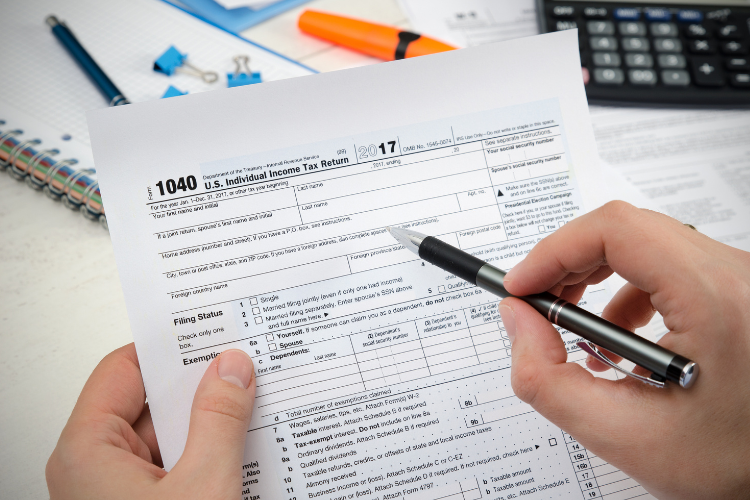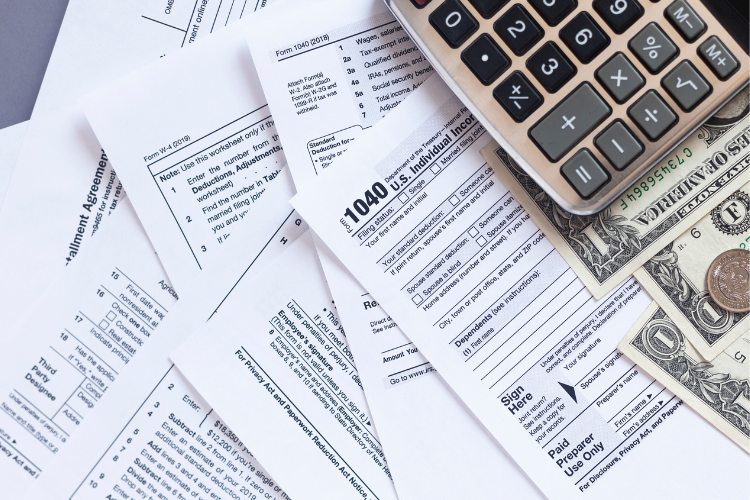Last Updated on June 3, 2025 by Maryam Siddiqui
Retired Americans Living in Portugal often describe the experience as a dream come true, and honestly, who can blame them? With its charming cobblestone streets, stunning coastline, and laid-back lifestyle, Portugal checks all the boxes for a peaceful, sun-drenched retirement. But before you kick back with a glass of wine, let’s talk about something a little less glamorous, but super important: taxes.
Yep, even in paradise, the tax man doesn’t take a holiday. Staying on the right side of the law means understanding your obligations, especially as a U.S. citizen abroad. The good news? Portugal’s tax situation is actually pretty straightforward for Americans. Stick around, because we’re breaking it all down in plain English, just the essentials you need to know.

Understanding Portugal’s Tax System for Expats
Let’s face it: even the most straightforward tax system can feel quite complicated if you don’t know how to proceed. In that regard, let’s take at the two fundamental things that will help you understand taxes for Retired Americans Living In Portugal.
Residency vs. non-residency for tax purposes
One of the most important issues when it comes to tax obligations for expats in Portugal is their residency status. You are a tax resident in Portugal if you meet the following criteria:
- You spend more than 183 days (consecutive or not) in Portugal during any 12-month period starting or ending in the same tax year.
- You have a home in Portugal that suggests you intend to keep and use it as a residence at any time during the tax year.
Your residency status is important because it determines how you will be taxed as an American expat living in Portugal. If you’re a tax resident, Portugal taxes you on your worldwide income. Yes, that includes U.S. pensions, social security, rental income, and any side hustles you might still be running online.
The flip side? Portugal has tax treaties and special schemes that can make this a lot more manageable and even tax-friendly for newcomers.
If you’re a non-resident, you’re only taxed on income that comes from Portuguese sources. That means if all your money is coming from the U.S., you might not owe much (or anything) in Portuguese income taxes.
Annual tax filing obligations
In Portugal, the tax year runs from January 1st to December 31st. You’ll need to file your annual tax return between April 1st and June 30th of the following year. Missing this deadline can lead to fines, interest, and other penalties, definitely not the kind of souvenir you want from your retirement abroad!
Whether you’re a resident with worldwide income or a non-resident with just local earnings, filing on time keeps you in good standing.
The tax process can be a bit tricky, especially if you have income from different countries or are using the NHR 2.0 scheme. If the forms and rules feel overwhelming, our experts at Viv Europe are always ready to handle all the complexity on your behalf.
Key terminology to know
Since you’re planning to make a permanent move from the US to Portugal, there are a few important tax-related terms you’re likely to come across.
NIF
The NIF (Número de Identificação Fiscal) is your Portuguese tax identification number. Think of it as your key to doing pretty much anything official in Portugal. You will need this I.D number when opening a bank account , signing a lease, setting up utilities and, of course, filing taxes.
For expats, getting a NIF is one of the very first (and most essential) steps to take when planning a move to Portugal. Without it, life can get pretty limited, so it’s best to sort it out early. You can get it either through a lawyer, tax rep, or by visiting a local Finanças office once you’re in the country.
IRS
In Portugal, the IRS (Imposto sobre o Rendimento das Pessoas Singulares) is the personal income tax system. Essentially, it’s how the government taxes individuals on their earnings.
For expats moving to Portugal, this is the tax you’ll deal with when reporting income like pensions, rental earnings, or freelance work. Whether you’re a resident or non-resident, the IRS system determines how much tax you owe based on your income type and source.
Understanding how it works is key to staying compliant and making the most of possible tax benefits, like the new IFICI program.
Autoridade Tributária e Aduaneira – Portugal’s Tax and Customs Authority
Well, if you’re planning to live or are already living the good life in Portugal, you’ll be dealing with the AT sooner or later. They’re the ones you’ll register with for your tax number (NIF), file your tax returns to, and generally interact with for any tax-related queries.
Knowing they exist and understanding their role is key to staying on the right side of the Portuguese taxman and avoiding any unwanted surprises. It’s all about being informed and compliant!
Portugal.com is your digital gateway to all things Portuguese, the ultimate cheat sheet for falling in love with Portugal. From in-depth guides on moving and lifestyle to insider tips on food, culture, and travel hotspots, Portugal.com is a must-have resource for expats, travelers, and Portugal lovers alike, and we’re thrilled to call them a partner!
The IFICI Tax Regime
Alright, let’s talk about the IFICI, which is Portugal’s brand new tax regime, stepping in to replace the old NHR. Now, this isn’t just a simple name swap – the IFICI is quite different. It’s specifically designed for high net worth individuals and those with highly specialized skills in fields like technology, science, art, and specific professional roles.
For those who qualify, the IFICI offers some sweet benefits that can really ease their tax situation in Portugal. We’re talking about potentially lower tax rates and tax reliefs for a period of up to 10 years.
If you’re one of the Retired Americans Living In Portugal or fit the high-value profile, the IFICI could make a significant difference to your finances. It’s all about Portugal attracting and retaining top talent and high-net-worth individuals!

Flat Tax Rates
For folks working in specific high-demand fields in Portugal, the new rules offer a special 20% flat personal income tax (IRS) rate. That’s pretty appealing for top professionals looking to make Portugal their home base.
But wait, there’s more! If you’re earning income from outside Portugal, it’s mostly tax-free under the IFICI! We’re talking about various types of income like employment earnings, freelance gigs, investment income, rental income, and even profits from selling assets. These foreign earnings are generally exempt, which can be a huge plus.
On top of that, any investments you make abroad within your first ten years in Portugal under this regime are also tax-free. Imagine your investments growing without the worry of immediate taxation!
U.S. Pension and Social Security Taxation
Yes, the U.S. taxes its citizens on their global income regardless of whether they live in the country or abroad. In light of this, do Retired Americans Living In Portugal need to pay taxes as well? Read more to find out!
Are U.S. Retirement Funds Taxed In Portugal?
It depends on the type of retirement income you’re receiving. Not all pensions are treated the same under Portuguese tax rules. For starters, the U.S. Social Security benefits are taxed at the source, meaning the U.S. government taxes them before you even see the money.
However, you still need to declare that income when filing your taxes in Portugal, even though it’s not taxed again there. If you’re receiving a U.S. government pension, like a civil service or military pension, that’s also taxed in the U.S. only and doesn’t get taxed again in Portugal. But remember, you still have to report it.
On the other hand, private pensions (like a 401(k), IRA, or other non-government retirement plans) are taxed in Portugal because they’re only taxed in your country of residence. So if your retirement income is mainly from private sources, expect to pay Portuguese taxes on that.
- Check out our comprehensive article on the Portugal Tax System: Easy Breakdown For Expats.
Treatment Of Pensions, 401(K)S, And IRAs
As we touched on earlier, not all pensions are created equal, especially when it comes to how they’re taxed in Portugal. For Retired Americans Living in Portugal, it’s important to know that 401(k)s and IRAs are considered private pension contributions. That means they’re taxable in your current country of residence. In this case, Portugal.
The same rules apply to annuities and occupational pensions. If they’re not classified as government pensions, Portugal considers them part of your taxable income.
But here’s the upside: Portugal offers some friendly tax perks to retirees through programs like the (IFICI). If you qualify, of course. These benefits can help reduce the tax burden on your retirement income and make your nest egg stretch further.
Let’s Move to Europe
With Viv Europe your plans for Europe will come to a reality
Taxation of U.S. Social Security in Portugal
While U.S. social security is taxed at source, what happens if you fall into the bracket of individuals who contribute to private pensions? Let’s discuss.
How the U.S. Portugal double taxation treaty affects this
If you’re moving to Portugal from the US, the tax treaty between the two countries helps make sure you don’t get taxed twice. That’s the good news.
But when it comes to Social Security benefits, things work a bit differently. Once you’re a tax resident in Portugal, those benefits are taxed by the Portuguese government. The US usually doesn’t tax them federally at that point, but depending on your state, you might still have a few obligations back home.
In Portugal, you must file an annual tax return using the Modelo 3 form. This includes all your global income, even Social Security. The taxes are progressive, so the more you earn, the higher your rate, with brackets ranging from 14.5 to 48 percent.
Also, when reporting income, everything needs to be converted into euros using the official exchange rate at the time.
Real Estate and Property Taxes
When moving to Portugal, one big decision you’ll face is whether to buy or rent a home. Both options have their perks, but from a tax perspective, things get interesting, especially depending on your residency status.
Let’s start with owning property. If you buy a home in Portugal, you’ll be expected to pay several taxes tied directly to that purchase.
These include the IMI, which is an annual property tax, the IMT, which is a one-time property transfer tax, and the IS, a stamp duty that’s also paid at the time of purchase. Each of these has its own rate and rules for how it’s calculated, often based on the value of the property.
If you’re renting instead, your tax obligations can change depending on whether you’re a resident or not. In most cases, residents are taxed on rental income and may have to declare it as part of their annual return.
IMI: Municipal Property Tax
IMI, or Municipal Property Tax, is an annual tax in Portugal for property owners. It helps fund local services and is based on the property’s assessed value, not the market price. For urban properties, rates range from 0.3 to 0.45 percent, while rural properties are taxed at a flat 0.8 percent.
There are some helpful exemptions. If you’re buying a home worth under €125,000 to live in or rent out, and your household income is below €153,300, you may qualify for a three-year exemption.
Households earning under €15,295 annually might even be eligible for a permanent exemption. These benefits can make a real difference, especially for first-time buyers or those on a modest income.
IMT: Property Transfer Tax
IMT, or Imposto Municipal sobre Transmissões Onerosas de Imóveis, is Portugal’s property transfer tax. If you’re an expat planning to buy property in Portugal, this is a tax you can’t ignore. It’s a one-time payment due whenever real estate changes hands, and it’s the buyer’s responsibility to pay it before the sale is finalized.
Notaries will require proof of IMT payment before completing the property transaction, so it’s an essential step in the buying process.
Rates vary by property type. Rural property is taxed at 5%, and most urban properties are taxed at 6.5%. If a company from a blacklisted tax jurisdiction is buying, the rate jumps to 10%. Knowing these rates ahead of time helps you budget and avoid last-minute surprises.
Does Portugal Have Inheritance Tax?
Inheritance tax is a tax on the assets you leave behind when you pass away. In Portugal, things work a little differently. To begin, Portugal has a system of forced heirship for residents, meaning certain family members must inherit a portion of your estate. Expats, on the other hand, can choose to have the succession laws of their home country apply instead.
Portugal doesn’t have a traditional inheritance tax. It was abolished in 2004. Instead, the government charges a stamp duty called Imposto do Selo. This applies to assets located in Portugal, which are taxed at a flat rate of 10%.
So while heirs might not face inheritance tax as such, they should still expect to pay this stamp duty unless exempt as a close relative like a spouse or child.

Wealth and Capital Gains Taxes
Capital gains tax is charged on the profit made from selling assets like property, stocks, or other investments. In Portugal, how this tax applies depends on whether you’re a resident.
Residents are taxed on only 50% of the gain, and it’s subject to progressive income tax rates. However, if your total income exceeds €39,000, choosing the flat 28% rate could work out better.
Non-residents selling Portuguese assets are also taxed on 50% of the gain, but at progressive rates set for non-residents.
Tax treaties, like the one between the US and Portugal, can affect your overall tax obligations. Always check how these agreements might impact your specific situation before selling any assets.
Do Americans still need to file U.S. taxes while living in Portugal?
Yes, Americans living in Portugal still need to file U.S. taxes each year, no matter where they live. In addition to your regular tax return, you may have to report foreign bank accounts through the FBAR and financial assets under FATCA.
These rules are in place to ensure transparency and prevent tax evasion. Even if you don’t owe anything thanks to exclusions or credits, the reporting is still required.
Tips For Retired Expats Navigating Taxes
Taxes can feel like a heavy burden, especially for retired expats living on a fixed income. But the good news is that there are ways to ease that load and keep more of your money.
Whether it’s through exemptions, smart planning, or taking advantage of international tax treaties, there are options worth exploring.
Keep reading to discover how you can make the most of your financial situation while staying fully compliant.
Open A Portuguese Bank Account Early
Opening a Portuguese bank account early can be a smart move for Retired Americans Living in Portugal. It helps streamline pension deposits, currency conversions, and daily expenses, while also making it easier to manage tax payments locally.
Having a local account may reduce foreign transaction fees and simplify compliance with both U.S. and Portuguese tax reporting, especially for FBAR and FATCA requirements. It can also help retirees take advantage of favorable exchange rates by timing transfers strategically.
Working with bilingual tax professionals
Working with bilingual tax professionals can make a big difference for Retired Americans Living in Portugal. These experts understand both U.S. and Portuguese tax laws, helping you avoid double taxation and costly mistakes.
For personalized support, consider speaking with our team at Viv Europe. Our experts are here to help you stay compliant while finding smart ways to save on taxes, so you can enjoy your retirement with less stress and more confidence.
Keep records in both languages
Keeping records in both English and Portuguese is a smart move for Retired Americans Living in Portugal. It simplifies communication with both U.S. and Portuguese tax authorities and helps bilingual tax professionals work more efficiently.
Good records also ensure you can claim personal deductibles in Portugal. Some of the deductibles include, health expenses, education costs, and general family deductions, which can reduce your taxable income.
Understand How Exchange Rates Affect Your Tax Filings
For Retired Americans Living in Portugal, it is important to understand exchange rates. Since Portugal uses the Euro, any income you receive in U.S. dollars, like retirement benefits, must be converted into Euros when filing taxes.
Fluctuations in the exchange rate can impact how much taxable income you report and ultimately affect how much tax you owe.
Do You Need Help Filing Taxes?
We understand that filing taxes in a new country can feel overwhelming, especially for new expats trying to figure it all out.
But here’s the good news: you don’t have to do it alone. There’s no shame in stepping back and letting experienced professionals take care of the complicated stuff.
Feel free to book a consultation with our tax advisors in Portugal! Viv Europe has been helping expats navigate their new lives with ease for years.
And if you’re curious about what others have experienced, join our Facebook Group – All About Portugal For Expats to share stories, ask questions, and connect with fellow expats. See you soon!





